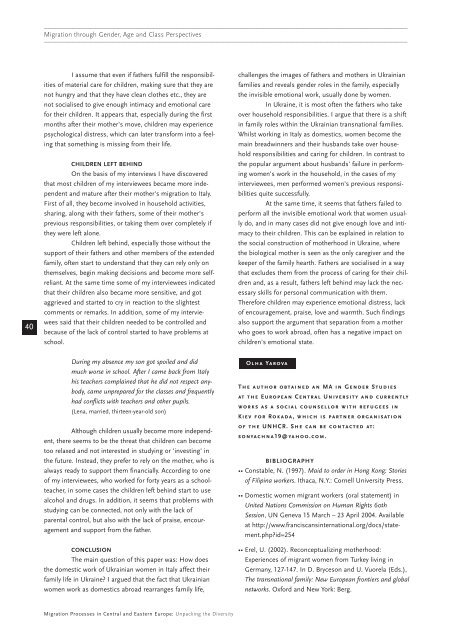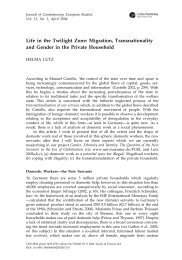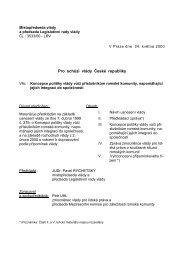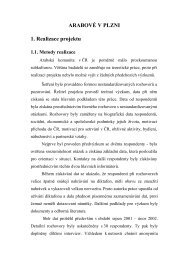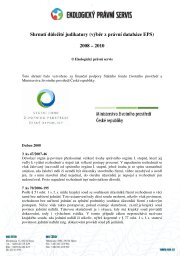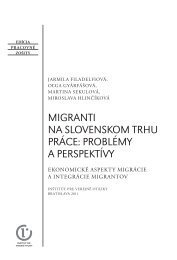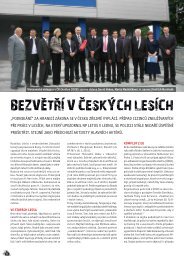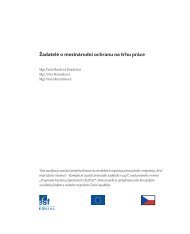Migration Processes in Central and Eastern Europe - Multiple Choices
Migration Processes in Central and Eastern Europe - Multiple Choices
Migration Processes in Central and Eastern Europe - Multiple Choices
You also want an ePaper? Increase the reach of your titles
YUMPU automatically turns print PDFs into web optimized ePapers that Google loves.
———————————————————————————————————————————————————————————————<br />
<strong>Migration</strong> through Gender, Age <strong>and</strong> Class Perspectives<br />
———————————————————————————————————————————————————————————————<br />
40<br />
I assume that even if fathers fulfill the responsibilities<br />
of material care for children, mak<strong>in</strong>g sure that they are<br />
not hungry <strong>and</strong> that they have clean clothes etc., they are<br />
not socialised to give enough <strong>in</strong>timacy <strong>and</strong> emotional care<br />
for their children. It appears that, especially dur<strong>in</strong>g the first<br />
months after their mother's move, children may experience<br />
psychological distress, which can later transform <strong>in</strong>to a feel<strong>in</strong>g<br />
that someth<strong>in</strong>g is miss<strong>in</strong>g from their life.<br />
CHILDREN LEFT BEHIND<br />
On the basis of my <strong>in</strong>terviews I have discovered<br />
that most children of my <strong>in</strong>terviewees became more <strong>in</strong>dependent<br />
<strong>and</strong> mature after their mother's migration to Italy.<br />
First of all, they become <strong>in</strong>volved <strong>in</strong> household activities,<br />
shar<strong>in</strong>g, along with their fathers, some of their mother's<br />
previous responsibilities, or tak<strong>in</strong>g them over completely if<br />
they were left alone.<br />
Children left beh<strong>in</strong>d, especially those without the<br />
support of their fathers <strong>and</strong> other members of the extended<br />
family, often start to underst<strong>and</strong> that they can rely only on<br />
themselves, beg<strong>in</strong> mak<strong>in</strong>g decisions <strong>and</strong> become more selfreliant.<br />
At the same time some of my <strong>in</strong>terviewees <strong>in</strong>dicated<br />
that their children also became more sensitive, <strong>and</strong> got<br />
aggrieved <strong>and</strong> started to cry <strong>in</strong> reaction to the slightest<br />
comments or remarks. In addition, some of my <strong>in</strong>terviewees<br />
said that their children needed to be controlled <strong>and</strong><br />
because of the lack of control started to have problems at<br />
school.<br />
challenges the images of fathers <strong>and</strong> mothers <strong>in</strong> Ukra<strong>in</strong>ian<br />
families <strong>and</strong> reveals gender roles <strong>in</strong> the family, especially<br />
the <strong>in</strong>visible emotional work, usually done by women.<br />
In Ukra<strong>in</strong>e, it is most often the fathers who take<br />
over household responsibilities. I argue that there is a shift<br />
<strong>in</strong> family roles with<strong>in</strong> the Ukra<strong>in</strong>ian transnational families.<br />
Whilst work<strong>in</strong>g <strong>in</strong> Italy as domestics, women become the<br />
ma<strong>in</strong> breadw<strong>in</strong>ners <strong>and</strong> their husb<strong>and</strong>s take over household<br />
responsibilities <strong>and</strong> car<strong>in</strong>g for children. In contrast to<br />
the popular argument about husb<strong>and</strong>s' failure <strong>in</strong> perform<strong>in</strong>g<br />
women's work <strong>in</strong> the household, <strong>in</strong> the cases of my<br />
<strong>in</strong>terviewees, men performed women's previous responsibilities<br />
quite successfully.<br />
At the same time, it seems that fathers failed to<br />
perform all the <strong>in</strong>visible emotional work that women usually<br />
do, <strong>and</strong> <strong>in</strong> many cases did not give enough love <strong>and</strong> <strong>in</strong>timacy<br />
to their children. This can be expla<strong>in</strong>ed <strong>in</strong> relation to<br />
the social construction of motherhood <strong>in</strong> Ukra<strong>in</strong>e, where<br />
the biological mother is seen as the only caregiver <strong>and</strong> the<br />
keeper of the family hearth. Fathers are socialised <strong>in</strong> a way<br />
that excludes them from the process of car<strong>in</strong>g for their children<br />
<strong>and</strong>, as a result, fathers left beh<strong>in</strong>d may lack the necessary<br />
skills for personal communication with them.<br />
Therefore children may experience emotional distress, lack<br />
of encouragement, praise, love <strong>and</strong> warmth. Such f<strong>in</strong>d<strong>in</strong>gs<br />
also support the argument that separation from a mother<br />
who goes to work abroad, often has a negative impact on<br />
children's emotional state.<br />
Dur<strong>in</strong>g my absence my son got spoiled <strong>and</strong> did<br />
much worse <strong>in</strong> school. After I came back from Italy<br />
his teachers compla<strong>in</strong>ed that he did not respect anybody,<br />
came unprepared for the classes <strong>and</strong> frequently<br />
had conflicts with teachers <strong>and</strong> other pupils.<br />
(Lena, married, thirteen-year-old son)<br />
Although children usually become more <strong>in</strong>dependent,<br />
there seems to be the threat that children can become<br />
too relaxed <strong>and</strong> not <strong>in</strong>terested <strong>in</strong> study<strong>in</strong>g or '<strong>in</strong>vest<strong>in</strong>g' <strong>in</strong><br />
the future. Instead, they prefer to rely on the mother, who is<br />
always ready to support them f<strong>in</strong>ancially. Accord<strong>in</strong>g to one<br />
of my <strong>in</strong>terviewees, who worked for forty years as a schoolteacher,<br />
<strong>in</strong> some cases the children left beh<strong>in</strong>d start to use<br />
alcohol <strong>and</strong> drugs. In addition, it seems that problems with<br />
study<strong>in</strong>g can be connected, not only with the lack of<br />
parental control, but also with the lack of praise, encouragement<br />
<strong>and</strong> support from the father.<br />
CONCLUSION<br />
The ma<strong>in</strong> question of this paper was: How does<br />
the domestic work of Ukra<strong>in</strong>ian women <strong>in</strong> Italy affect their<br />
family life <strong>in</strong> Ukra<strong>in</strong>e? I argued that the fact that Ukra<strong>in</strong>ian<br />
women work as domestics abroad rearranges family life,<br />
Olha Yarova<br />
The author obta<strong>in</strong>ed an MA <strong>in</strong> Gender Studies<br />
at the <strong>Europe</strong>an <strong>Central</strong> University <strong>and</strong> currently<br />
works as a social counsellor with refugees <strong>in</strong><br />
Kiev for Rokada, which is partner organisation<br />
of the UNHCR. She can be contacted at:<br />
sonyachna19@yahoo.com.<br />
BIBLIOGRAPHY<br />
•• Constable, N. (1997). Maid to order <strong>in</strong> Hong Kong: Stories<br />
of Filip<strong>in</strong>a workers. Ithaca, N.Y.: Cornell University Press.<br />
•• Domestic women migrant workers (oral statement) <strong>in</strong><br />
United Nations Commission on Human Rights 60th<br />
Session, UN Geneva 15 March – 23 April 2004. Available<br />
at http://www.franciscans<strong>in</strong>ternational.org/docs/statement.php?id=254<br />
•• Erel, U. (2002). Reconceptualiz<strong>in</strong>g motherhood:<br />
Experiences of migrant women from Turkey liv<strong>in</strong>g <strong>in</strong><br />
Germany, 127-147. In D. Bryceson <strong>and</strong> U. Vuorela (Eds.),<br />
The transnational family: New <strong>Europe</strong>an frontiers <strong>and</strong> global<br />
networks. Oxford <strong>and</strong> New York: Berg.<br />
<strong>Migration</strong> <strong>Processes</strong> <strong>in</strong> <strong>Central</strong> <strong>and</strong> <strong>Eastern</strong> <strong>Europe</strong>: Unpack<strong>in</strong>g the Diversity


